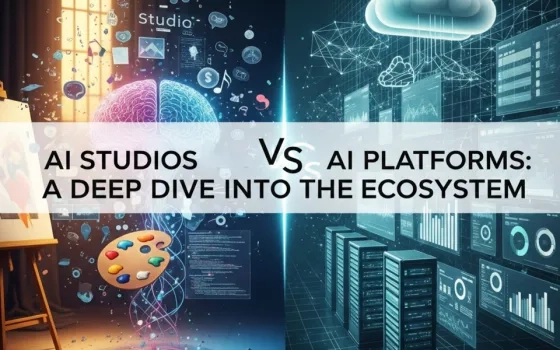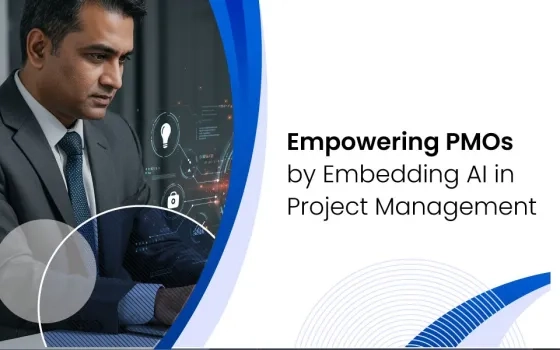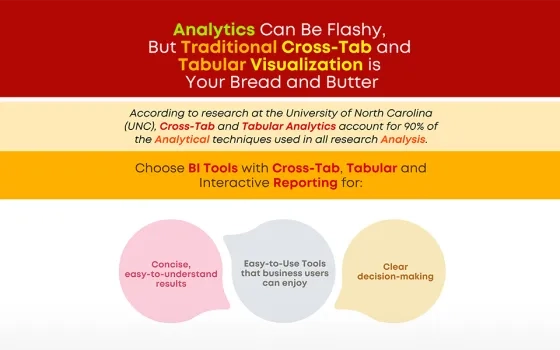In my first blog on AI Studios, “Decoding AI Studios: Making AI Accessible for Business,” I introduced the concept of AI Studios as the business-friendly GenAI/ Agentic AI versions of the more developer-centric AI Platforms, key features of AI Studios, and their limitations vis-à-vis Platforms.
This blog explores the top global AI Studio products being popularly adopted currently. There’s quite a diversity of global software product providers that offer AI Studios, ranging from Hyperscalers and even midsized cloud providers, to enterprise software companies – both horizontal such as a SAP or vertical such as a Zendesk that also happens to be a SaaS player. Not to be left behind, even top Indian tech services companies are in the AI Studios fray.
Interestingly, most of these leading companies also has an AI Platform offering. As official AI adoption decentralizes from an organization’s IT to individual business/ functional units, demand for AI Studios is only expected to increase. Yet, enterprise-scale integrations across these functionally deployed Studios will require IT interventions, which is where developer-grade Platforms become crucial.
The table below compares, in brief, Platforms and Studios by each of the ten leading companies sampled for this analysis, with a focus on how Studios complement Platforms by shifting focus from IT enablement to user specific adoption.
|
Category
|
Company
|
AI Platform (Infra, APIs, MLOps)
|
AI Studio (Builder Interface)
|
Key Differences / Use Case
|
|
Hyperscalers/Cloud
|
Google
|
Vertex AI Platform:
Full MLOps stack to train, deploy & evaluate AI models with governance.
|
Google AI Studio:
Web-based IDE for prototyping prompts.
Tuning Gemini models and exporting to Vertex at scale.
|
Studio is lightweight, ideal for experimentation and prompt prototyping.
Platform is fully managed, enterprise-ready deployment
|
|
Amazon Web Services
|
Amazon SageMaker AI:
ML infra with AI model training, hosting, pipelines.
|
SageMaker Studio + Bedrock IDE:
Unified development environment (notebook-based) for building, tuning, and quick GenAI prototyping.
|
Studio slightly developer-oriented to give hands-on development environment.
Platform provides scale, infrastructure, and model governance.
|
|
Microsoft
|
Azure AI Platform: Includes Model Catalog, core Azure AI Services.
|
Azure AI Foundry:
UI for building, evaluating, and deploying AI agents with safety and prompt tools.
|
Foundry simplifies agent composition.
Platform ensures enterprise-grade deployments and policies.
|
|
Enterprise Apps
|
Salesforce
|
Einstein Platform:
Embedded AI across CRM (Data Cloud, metadata, security).
|
Einstein 1 Studio:
No-code co-pilot & prompt builder for business users.
|
Studio crafts customized AI assistants.
Platform manages customer data, integration, and deployment.
|
|
ServiceNow
|
Now Platform AI:
Workflow and automation infrastructure.
|
AI Agent Studio:
Tools to design conversation agents for ITSM/HR workflows.
|
Studio facilitates designing automated agents.
Platform executes and manages them.
|
|
Oracle
|
Oracle Cloud Infra (OCI) AI Services:
Model endpoints, GenAI APIs, data infrastructure.
|
Oracle AI Agent Studio:
Easy-to-use builder for enterprise-class agents orchestrating across Oracle apps.
|
Studio enables agent creation.
Platform handles scaling, deployment, and security.
|
|
IBM
|
watsonx Platform:
Includes AI, data, and governance layers.
|
watsonx.ai Studio:
Interface for building/fine-tuning models and agents.
|
Studio streamlines model tuning.
Platform governs data access, regulatory compliance.
|
|
CX Saas
|
Zendesk
|
Zendesk AI Platform:
Underlying AI-powered CX features (ticketing, insights).
|
Zendesk AI Agent Builder:
Setup interface for support agents with modular logic.
|
Studio configures bot behaviours.
Platform runs bots within support workflows.
|
|
HubSpot
|
HubSpot AI Platform:
Foundational AI for CRM automation.
|
HubSpot Breeze Agents (Copilot Builder):
Drag-and-drop assistant builder.
|
Studio provides builder UI.
Platform embeds Copilots into marketing and sales pipelines.
|
|
Vertical Saas
|
DotKonnekt
|
DotKonnekt Platform:
Vertical retail AI infrastructure with connectors.
|
Vertical AI Studio:
Domain-specific agent builder for retail/CPG workflows.
|
Studio uses business-defined vertical models/ data.
Platform provides data, integrations, and execution environment.
|
Table 1: How leading companies differentiate between their AI platforms and AI studios
While majority companies have differentiated AI Studios to feature non-tech usage capabilities, there are builder-grade extensions available that integrate a quick-to-start Studio with the deeper, extensible, and integrated Platforms for enterprise scale. AI Studios aim to provide a fine balance between quick start and fail fast and the feature extensibility to appeal to a diverse set of business users, as well as developers. AI Studios are also able to bring sharper vertical integration through pipelining of data and models to finetuning and orchestrating agentic AI architecture across simple-to-complex workflows within a business or product line.
AI Studio offerings
Basis the sample of leading products, there are certain capability dimensions that help differentiate current AI Studios from Platforms. Each dimension provides a lens to understand the positioning and usability of these Studios:
1. Developer-Friendliness: Developer-friendliness reflects how well a studio supports technical teams with SDKs, APIs, frameworks, and flexible tooling.
2.Business-User Friendliness: Business-user friendliness measures accessibility for non-technical roles via no-code/low-code interfaces.
3. Vertical vs. Horizontal Scope: Some studios are vertical specialists, others horizontal platforms.
4. BYOM (Bring Your Own Model): BYOM reflects how open a studio is to custom or third-party models.
5. Native Model Catalogs: Studios with rich native model catalog (prebuilt library of AI/ML models) give users a head start.
These factors become clearer when mapped against actual market offerings from leading hyperscalers, enterprise app providers, and SaaS platforms.

Figure 1: Feature strength heatmap for different AI studios present in the market
Note: Feature Strength is an aggregation of how well each studio supports different categories.
The heatmap compares AI Studios across developer-friendliness, business-user accessibility, BYOM support, and native model catalogs. Here are the takeaways:
· IBM watsonx.ai, Microsoft Azure AI Foundry, and AWS SageMaker Studio rank higher in Developer-Friendliness. They expose APIs, RAG tooling, and agent frameworks that appeal to enterprise developers. In contrast, business-first SaaS studios like Zendesk or HubSpot trade raw flexibility for speed and ease of use.
· Salesforce Einstein 1 Studio, Zendesk AI Agent Builder, HubSpot Breeze Agents, and Oracle AI Agent Studio lead in Business-User Friendliness. They enable admins, ops owners, and marketers to build copilots within the apps they already use, bypassing IT bottlenecks.
· DotKonnekt Vertical AI Studio is a clear vertical play, embedding domain knowledge in retail/CPG workflows. Meanwhile, Google Vertex AI Studio, Azure AI Foundry, and IBM watsonx.ai are horizontal environments, spanning industries with wide model catalogs and governance features.
· AWS SageMaker Studio, Google Vertex AI Studio, and IBM watsonx.ai excel in BYOM, giving enterprises control to embed proprietary IP or open-source models. By contrast, SaaS studios often prioritize their own ecosystem models over external integration.
· Azure AI Foundry, Google Vertex AI Studio, and IBM watsonx.ai offer broad catalogs of foundation models hence ranked higher in Native Model Catalogs. SaaS providers like Salesforce Einstein Studio or Oracle AI Agent Studio integrate curated, app-specific models instead.
AI Studios by Tech Service Companies
Since 2023, most large IT service companies like Infosys (Topaz), TCS (Wisdom Next), HCLTech (AI Force), and Wipro (WeGA) have launched AI platforms. These platforms were primarily designed for IT organizations for integrating data, enabling governance, and orchestrating large-scale deployments. But AI adoption in the last 6-12 months has shifted towards business users, the CMOS, Sales Heads, CHROs, etc., wanting AI-enabled or agentified CRMs, ERPs, HRMSes. While product companies have moved a lot faster, top services companies are beginning to catchup with parallel offerings, even as their core offering continues to be fully developer-suited Platforms that appeal to a broader set of client IT teams.
- Wipro WeGA Studio sits atop its AI accelerators, giving clients’ business users a way to build tailored use cases.
- TCS AI VX Studio emphasizes vertical-focused solutions, aligning with industry contexts.
- Accenture GenAI Studios act more as client-facing innovation hubs than productized tools.
Tech service providers have not yet turned AI Studios into a mainstream offering, visibly missing out on the gradually emerging shifts in IT selection/procurement decentralizing from IT to the business side, officially. Unless these services companies add Studios also to their repertoire of AI offerings, they risk losing out on the business-user space to even the niche SaaS vendors.
Conclusion
The AI Studios landscape reflects a fundamental shift in the consumption of enterprise-grade AI within an enterprise, allaying fears of shadow IT if and when managed transparently and in alignment with official enterprise IT policies. The landscape, as of today, also highlights an gap in service providers AI strategy. For customers, therefore, the choice is based on a few factors – decision-making on AI procurement and AI integration into enterprise tech stacks, level of alignment between an enterprise’s IT and business owners, and the speed and appetite for AI experimentation, failure, and realignment for scaled deployment.
- For developers and IT teams → Hyperscaler studios like AWS SageMaker Studio, Azure AI Foundry, or IBM watsonx.ai offer maximum flexibility, APIs, and BYOM support.
- For business users → SaaS-native studios like Salesforce Einstein Studio, HubSpot Breeze Agents, and Zendesk AI Agent Builder provide easy, embedded copilots with minimal technical overhead.
- For vertical industries → Specialized studios like DotKonnekt deliver domain-focused capabilities that general-purpose studios cannot.
The choice isn’t just about current features of a fast-evolving space, it’s about committing to a viable, sustainable, scalable way to embrace, adopt, and deeply integrate AI across the enterprise. The smartest buyers will look beyond today’s feature lists and ask: How will this AI offering – Studio or Platform – fit my organization’s evolving data strategy, rapidly changing governance framework, and future competitiveness? The decision – platform-first, studio-first, or hybrid – will differentiate successfully AI-first organizations from the nots.



















